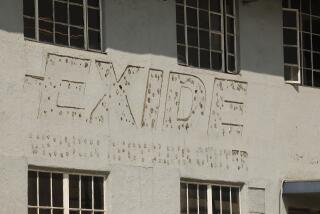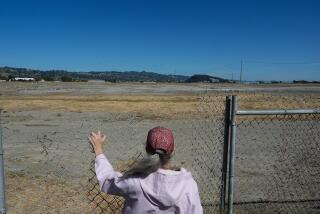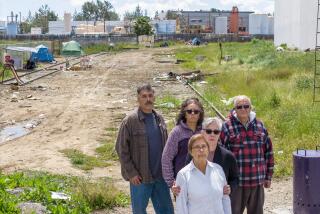Hazardous Waste Storage Firm to Remain Open
A Rialto facility that stores hazardous waste and has a history of environmental violations will be allowed to remain open under new management and in a limited capacity, state and company officials said Wednesday.
The company, Denova Environmental Inc., will be allowed to continue receiving certain kinds of explosive waste, once it meets terms of a settlement with the California Department of Toxic Substances Control.
The state has backed away from earlier moves to shut down the facility and fine its operators $2.5 million. Denova will be allowed to appeal to the state to reduce the fine substantially, said Denova’s Newport Beach attorney, Charles Whisonant.
The agreement also calls for Denova to remove all hazardous waste from its 20-acre site in northern Rialto, Whisonant said. Once that happens--it’s unclear how long it will take--the company will be allowed to store up to 2,000 pounds of explosive waste such as old munitions.
However, Denova is in negotiations to sell its operations to another company, Whisonant said. The new company, which Whisonant would not name, will likely apply for a permit to store thousands more pounds of explosive waste at the site than the agreement permits, he said.
Employees will be required to undergo additional training for handling waste under the settlement. Acting Denova President Robert Cole will also be prohibited from maintaining a management role in the company, said Jeanne Garcia, a spokeswoman for the California Department of Toxic Substances Control.
Denova has a long history of environmental violations.
Last year, canisters of chemicals and hazardous waste stored there ignited, causing a brief fire and sending firefighters scurrying to develop contingency plans for evacuating a large portion of the city. Concerned that removing containers filled with waste could cause deadly explosions, firefighters called in the FBI and a local bomb squad to blow them up on site.
Denova is the last nongovernmental organization in California licensed to handle many types of explosive waste.
After the state suspended its operating license last year, the company argued that government contractors and law enforcement agencies counting on it to store their explosive waste would have to ship it out of state if Denova were forced to close. That would have increased the number of waste shipments traversing the state, and could be dangerous and expensive, the company maintained.
“There is a need for this type of operation in California,” Whisonant said. “Without the type of services that Denova provided, you are talking about shipping a lot of small quantities of small explosives at great expense.”
This week, the state concluded that Denova, despite its troubled past, performs a service for Southern California.
“They do provide a valuable and important service out there,” Garcia said. “We felt that as long as they comply with all the requirements, we will work with them. This is not a blanket approval. They need to follow the requirements.”
Environmental activists called the agreement predictable.
Many companies whose business involves the handling or storage of toxic or industrial waste have moved to the Inland Empire in recent years--partly because land is far more available than in coastal areas, but also, activists say, because environmental oversight is less stringent in the region.
“This is like Stringfellow all over again,” said Jeff Morgan, vice chairman of an Inland Empire Sierra Club group, referring to a notorious toxic dump near Riverside that was once a receptacle for 35 million gallons of industrial chemicals. “Just because this is the Inland Empire doesn’t mean it’s not important that these things should be monitored.”
More to Read
Sign up for Essential California
The most important California stories and recommendations in your inbox every morning.
You may occasionally receive promotional content from the Los Angeles Times.











